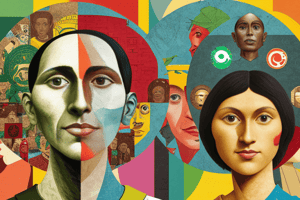Podcast
Questions and Answers
What is your understanding of culture?
What is your understanding of culture?
How can we train counsellors to be effective in various cultures?
How can we train counsellors to be effective in various cultures?
What if the counsellor and the client come from different cultures?
What if the counsellor and the client come from different cultures?
Do you have any personal experience of ubuntu?
Do you have any personal experience of ubuntu?
Which of the following best describes the concept of ubuntu?
Which of the following best describes the concept of ubuntu?
Africa as a multi-layered continent poses many challenges to effective counselling.
Africa as a multi-layered continent poses many challenges to effective counselling.
Social justice can be the bridge towards cultural competence.
Social justice can be the bridge towards cultural competence.
Counselling services are moving towards greater inclusivity and becoming more context relevant.
Counselling services are moving towards greater inclusivity and becoming more context relevant.
What does the concept of ubuntu primarily emphasize?
What does the concept of ubuntu primarily emphasize?
Which method of cultural adoption does not involve direct interaction?
Which method of cultural adoption does not involve direct interaction?
What type of personal orientation aligns with an individual focusing on their own agency?
What type of personal orientation aligns with an individual focusing on their own agency?
Which phrase reflects the essence of ubuntu?
Which phrase reflects the essence of ubuntu?
What is a challenge that Africa's multi-layered context presents to effective counseling?
What is a challenge that Africa's multi-layered context presents to effective counseling?
How can cultural competence be enhanced according to the content?
How can cultural competence be enhanced according to the content?
What does rule orientation in counselling primarily focus on?
What does rule orientation in counselling primarily focus on?
Which component of counselling identities pertains to the expected duties and tasks in a social context?
Which component of counselling identities pertains to the expected duties and tasks in a social context?
How does cultural competence in counselling assist interactions?
How does cultural competence in counselling assist interactions?
What is a potential danger of using language-specific terminology in counselling?
What is a potential danger of using language-specific terminology in counselling?
Intersectionality in counselling refers to the interactions of which of the following?
Intersectionality in counselling refers to the interactions of which of the following?
What must be prioritized in value orientation in counselling?
What must be prioritized in value orientation in counselling?
What term describes the combination of a client's rules, roles, and values in the counselling process?
What term describes the combination of a client's rules, roles, and values in the counselling process?
Which of the following best describes cultural competence in the context of counselling?
Which of the following best describes cultural competence in the context of counselling?
Flashcards are hidden until you start studying
Study Notes
Understanding Diversity and Culture in Counselling
- Culture encompasses shared beliefs, values, practices, and social norms within a group, influencing individual behavior and interaction.
- Effective training for counsellors includes cultural competence, which enables them to navigate diverse client backgrounds.
- Different cultural backgrounds between counsellor and client may pose challenges but can also enrich the counselling experience.
Counselling Identities
- Rule-, role-, and value orientation are essential in counselling, encompassing:
- Rule Orientation: Identifying and prioritizing societal expectations in social contexts.
- Role Orientation: Committing to socially obligated tasks and responsibilities.
- Value Orientation: Recognizing and prioritizing underlying beliefs of the social context.
Intersectionality in Counselling
- Intersectionality examines how various aspects like culture, race, sexual orientation, age, disability, and religion interact and influence individual experiences.
Communication and Language in Counselling
- Expressing oneself in one's native language is crucial for effective communication in counselling.
- Utilizing culture-specific terminology can enhance understanding but may also lead to risks associated with translation misunderstandings.
Acculturation
- Minority groups interact with dominant cultures in diverse ways, such as:
- Direct and Remote: Sharing across borders through transnationalism.
- Exploration and Integration: Adopting multiple perspectives within one culture.
- Technology: Modern advances enabling cultural exchange and fostering global culture.
Well-Being and Cultural Assets
- Cultural and personal assets can influence well-being, categorized into:
- Individualistic Personal Agency: Emphasizing personal responsibility.
- Collectivistic-Relational Personal Agency: Focusing on relationships and community ties.
Concept of Ubuntu
- Ubuntu promotes social interconnectedness with the philosophy "I am because we are."
- Highlights the value of community engagement and networks, with the saying "Umuntu ngumuntu ngabantu" illustrating mutual dependency.
- Acknowledges individuality within collectivism and the potential challenges of heterogeneity in community dynamics.
Case Studies for Application
- Explore practical examples through different case studies, such as Johannes Adams, Sipho Gumede, and Nobuhle Dlamini for deeper insights into cultural effects on counselling practices.
Chapter Reflection and Evaluation
- Africa’s complexity as a multi-layered continent presents challenges for effective counselling.
- Social justice initiatives may bridge gaps toward achieving cultural competence.
- Counselling services are increasingly focusing on inclusivity and contextual relevance to better serve diverse populations.
Understanding Diversity and Culture in Counselling
- Culture encompasses shared beliefs, values, practices, and social norms within a group, influencing individual behavior and interaction.
- Effective training for counsellors includes cultural competence, which enables them to navigate diverse client backgrounds.
- Different cultural backgrounds between counsellor and client may pose challenges but can also enrich the counselling experience.
Counselling Identities
- Rule-, role-, and value orientation are essential in counselling, encompassing:
- Rule Orientation: Identifying and prioritizing societal expectations in social contexts.
- Role Orientation: Committing to socially obligated tasks and responsibilities.
- Value Orientation: Recognizing and prioritizing underlying beliefs of the social context.
Intersectionality in Counselling
- Intersectionality examines how various aspects like culture, race, sexual orientation, age, disability, and religion interact and influence individual experiences.
Communication and Language in Counselling
- Expressing oneself in one's native language is crucial for effective communication in counselling.
- Utilizing culture-specific terminology can enhance understanding but may also lead to risks associated with translation misunderstandings.
Acculturation
- Minority groups interact with dominant cultures in diverse ways, such as:
- Direct and Remote: Sharing across borders through transnationalism.
- Exploration and Integration: Adopting multiple perspectives within one culture.
- Technology: Modern advances enabling cultural exchange and fostering global culture.
Well-Being and Cultural Assets
- Cultural and personal assets can influence well-being, categorized into:
- Individualistic Personal Agency: Emphasizing personal responsibility.
- Collectivistic-Relational Personal Agency: Focusing on relationships and community ties.
Concept of Ubuntu
- Ubuntu promotes social interconnectedness with the philosophy "I am because we are."
- Highlights the value of community engagement and networks, with the saying "Umuntu ngumuntu ngabantu" illustrating mutual dependency.
- Acknowledges individuality within collectivism and the potential challenges of heterogeneity in community dynamics.
Case Studies for Application
- Explore practical examples through different case studies, such as Johannes Adams, Sipho Gumede, and Nobuhle Dlamini for deeper insights into cultural effects on counselling practices.
Chapter Reflection and Evaluation
- Africa’s complexity as a multi-layered continent presents challenges for effective counselling.
- Social justice initiatives may bridge gaps toward achieving cultural competence.
- Counselling services are increasingly focusing on inclusivity and contextual relevance to better serve diverse populations.
Studying That Suits You
Use AI to generate personalized quizzes and flashcards to suit your learning preferences.



